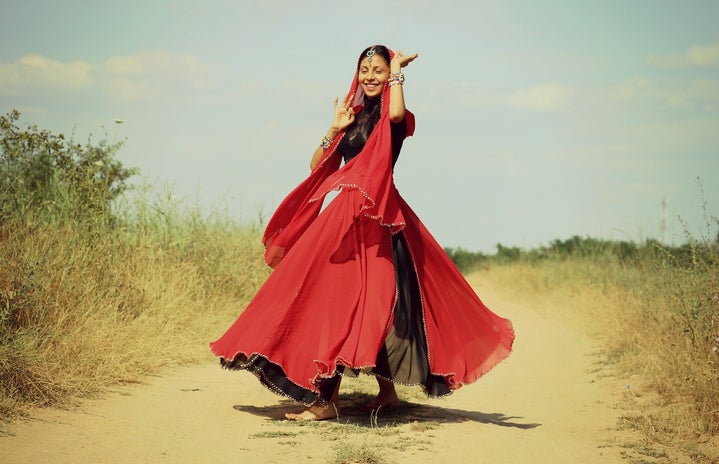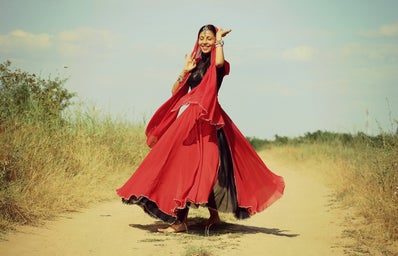To be a South Asian woman ashamed of who she is in the United States is hard enough. To be a South Asian woman ashamed of who she’s becoming is harder.
I’ll use myself as an example.
Deep within the drawers of my childhood vanity was a box teeming with white paper squares, each blanketed in an adhesive to hold hundreds of delicate, glimmering bindis laced with gold.
A bindi is a colored dot, sticker or jewel worn on the center of the forehead by South Asian women. It is a decorative mark traditionally believed to represent “the third eye,” but is also worn as an adornment or a sign of marriage.
On occasions when wearing one was unavoidable, my fingers would nervously feel for a bindi to place between my bushy eyebrows. It felt like the burning ember of a fire sitting above the bridge of my nose, branding me with the ferocity of my ethnic roots. I would slip away into the night, shuddering with the fear of people catching sight of the blazing wildfire on my forehead.
This was the characteristic mindset I carried with me throughout much of my life. I adored the beauty of bindis and the symbol of Asian womanhood wrapped into an elegant, sticky gem. But as a young girl living in the lands of the United States, every burning tie to my brown skin could only be extinguished by loathing and embarrassment.
I grew embarrassed of wearing these statements on my forehead and feeling the stares following me as I walked. I grew so ignorant of the beauty of Indian clothes that I felt the need to hide beneath winter coats, even on the hottest days of June. I became ashamed of being stripped of a culture my family has worked tirelessly to pass down.
As the only child of color in school after school, I was made to feel guilty for everything I am. It was years of being asked why I pronounced words with the accent of a girl who spent her summers in Sri Lanka. It was an education of teachers rolling their eyes at my good grades. It was being questioned, time and time again, if I knew of another person who lived across the country because they, too, were brown. It was a lifetime of questioning if classroom crushes would ever grow to like me simply because of the glaring tint of my skin.
At recess, I formed a sisterhood with the black pavement beneath my feet; cracked and colorful, we shared a secret beauty.
I never complained. Instead, I conformed.
I became the girl that it seemed like I was pushed to become. I straightened my thick, black hair. I wore ripped skinny jeans and ordered vanilla bean frappuccinos. I rarely spoke of my dreams for the future, but when my mouth opened, it sang forced melodies of perfect American English. Plates of steaming Sri Lankan delicacies were traded for pasta and dry sandwiches. I paid too much money for caramel highlights and extra piercings. I begged to quit Bharatanatyam classes and the delicate dance between an identity styled in jeans and one draped in sarees.
Bharatanatyam is an Indian classical dance. Dancers typically perform in a saree, a traditional garment consisting of a long piece of fabric draped elegantly around the body.
Unsurprisingly, it wasn’t enough. Labeled a coconut (brown on the outside, “white” on the inside), I was grouped with those who are now only a shell of the vibrant people they used to be.
We share a childhood of being told to make our community proud in the face of normalized racial slurs and degradation. We recognize the beauty of traditional clothing, facial gems, and thick hair, exclusive to runways and white models. We harbor fears of our friends visiting our “foul-smelling” kitchens as our mothers cook our favorite ethnic dishes. We neglect the fading heritage, rusted languages, and “funny” accents that once allowed us to speak to our grandparents. We grow up in a world where stereotypes never die; from our first breaths to the day we check the small box on our college applications, we are reduced to “Asian American” and nothing more.
We are in a generation of normalized, inconspicuous societal discrimination.
We are irrevocably colorful. Sometimes, that feels like all we’ll ever be.
At the age of 20, I wonder what cultural appreciation I will have left to offer my own children. I long for a world where I can wear bindis without the exhausting inner monologue of, “What will people think?” I yearn for a world where South Asian women can represent their ethnicity as much as they choose to, without sideways glances or unrelenting labels. A world where acceptance isn’t conditional.
A world where you appreciate us for who we are and we live as whoever we want to be.


